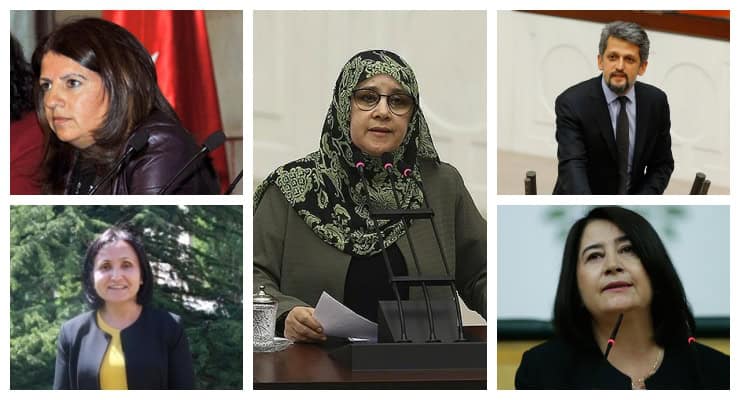A Turkish court on Tuesday began to hear the trial of five former lawmakers from a pro-Kurdish party over their alleged role in violent protests that erupted in southeastern Turkey over a siege of the Syrian Kurdish town of Kobani by the Islamic State in Iraq and the Levant (ISIL) in 2014, the BBC Turkish edition reported.
The indictment, accepted by the Ankara 22nd High Criminal Court on May 28, demands 38 aggravated life sentences in addition to 19,680 years in prison for each of former pro-Kurdish Peoples’ Democratic Party (HDP) lawmakers Hüda Kaya, Serpil Kemalbay Pekgözegü, Garo Paylan, Fatma Kurtulan and Pero Dundar.
This indictment, drafted for the five Kurdish politicians due to their alleged role in the Kobani protests, came shortly after an Ankara court sentenced 24 other HDP politicians for their alleged roles in the deadly protests in 2014 to prison terms ranging from nine to 42 years, while acquitting 12 others who had stood trial with them.
The trial, which lasted nearly three years, centered on the events of October 6-8, 2014, when ISIL laid siege to Kobani. Protests erupted across Turkey, particularly in the predominantly Kurdish southeastern provinces, resulting in 37 deaths. There were 108 defendants in the trial including former HDP co-chairs Selahattin Demirtaş and Figen Yüksekdağ.
The Turkish government accused the HDP leaders of inciting the violence, while the defendants maintained that their calls for solidarity with Kobani were within the bounds of freedom of expression.
According to the second indictment, the five politicians should also be tried on the same charges faced by the politicians in the first Kobani trial on the grounds that they joined the HDP executives and politicians in calling on the people to take to the streets.
The five politicians are standing trial on 29 different charges, ranging from attempting to “destroy the unity and integrity of the state” and “membership in a terrorist organization” to “murder.”
Although Kaya was in held pre-trial detention, other former lawmakers are abroad and considered fugitives.
Kaya was released from detention at the end of the hearing on Tuesday after spending eight months behind bars. She was welcomed by rights activists and DEM Party officials when she left Sincan Prison in Ankara on Tuesday evening.
The pro-Kurdish Kurdish Peoples’ Equality and Democracy Party (DEM Party) Co-chairperson Tülay Hatimoğulları spoke to the press before the hearing, saying that the ruling Justice and Development Party (AKP) staged the second Kobani trial as a “conspiracy case” because they “failed to cripple the HDP politically.”
“The Kobani conspiracy trial is the result of [the actions of] a judiciary that has turned into a crutch of the AKP and the palace [President Recep Tayyip Erdoğan] and is guided by indictments written in the palace. … The sentences being handed down [to Kurdish MPs] … are pro-ISIL decisions. We will never accept them,” she added.
The HDP is the predecessor of the DEM Party.
Pro-Kurdish parties in Turkey are frequently accused of links to the outlawed Kurdistan Workers’ Party (PKK), and dozens of their politicians and members are in jail on terrorism charges. In the past, many such parties were closed down by the Constitutional Court due to their alleged links to the PKK, listed as a terrorist organization by Turkey and its Western allies. Every time a party was closed, another one was established in short order.
The Kobani trial has significant political implications, especially for Kurdish politicians, who have been under intense pressure from Erdoğan’s government. The government’s stance hardened following the failure of peace talks with the PKK in 2015, leading to a more nationalist and anti-Kurdish policy.
The ongoing detentions of Kurdish politicians have drawn significant attention and criticism from both local and international observers who argue that the charges against them are politically motivated and part of an ongoing government crackdown on Kurds.

